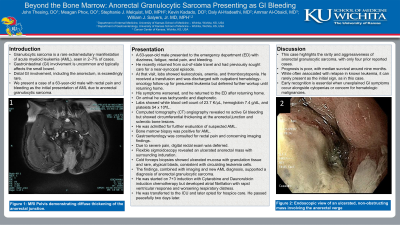Monday Poster Session
Category: Colon
P2466 - Beyond the Bone Marrow: Anorectal Granulocytic Sarcoma Presenting as GI Bleeding


John Thesing, DO
University of Kansas School of Medicine - Wichita
Wichita, KS
Presenting Author(s)
1University of Kansas School of Medicine - Wichita, Wichita, KS; 2University of Kansas School of Medicine, Wichita, KS; 3University of Kansas School of Medicine-Wichita, Wichita, KS; 4Wichita-KUMC, Wichita, KS; 5Cancer Center of Kansas, Wichita, KS
Introduction:
Granulocytic sarcoma is a rare extramedullary manifestation of acute myeloid leukemia (AML), seen in 2–7% of cases. Gastrointestinal (GI) involvement is uncommon and typically affects the small bowel. Distal GI involvement, including the anorectum, is exceedingly rare. We present a case of a 63-year-old male with rectal pain and bleeding as the initial presentation of AML due to anorectal granulocytic sarcoma.
Case Description/Methods:
A 63-year-old male presented to the emergency department (ED) with dizziness, fatigue, rectal pain, and bleeding. He recently returned from out-of-state travel and had previously sought care for a near-syncopal episode. At that visit, labs showed leukocytosis, anemia, and thrombocytopenia. He received a transfusion and was discharged with outpatient hematology-oncology follow-up for presumed leukemia but deferred further workup until returning home.
His symptoms worsened, and he returned to the ED after returning home. On arrival he was tachycardic and diaphoretic. Labs showed white blood cell count of 23.7 K/μL, hemoglobin 7.4 g/dL, and platelets 54 x 10⁹/L. Computed tomography (CT) angiography revealed no active GI bleeding but showed circumferential thickening at the anorectal junction and sclerotic bone lesions.
He was admitted for further evaluation of suspected AML. Bone marrow biopsy was positive for AML. Gastroenterology was consulted for rectal pain and concerning imaging findings. Due to severe pain, digital rectal exam was deferred. Flexible sigmoidoscopy revealed an ulcerated anorectal mass with surrounding induration. Cold forceps biopsies showed ulcerated mucosa with granulation tissue and rare, atypical blasts, consistent with circulating leukemia cells. The findings, combined with imaging and new AML diagnosis, supported a diagnosis of anorectal granulocytic sarcoma.
He was started on 7+3 induction chemotherapy but developed atrial fibrillation with rapid ventricular response and worsening respiratory distress. He was transferred to the ICU and later opted for hospice care. He passed peacefully two days later.
Discussion: This case highlights the rarity and aggressiveness of anorectal granulocytic sarcoma, with only four prior reported cases. Prognosis is poor, with median survival around nine months. While often associated with relapse in known leukemia, it can rarely present as the initial sign, as in this case. Early recognition is essential when unexplained GI symptoms occur alongside cytopenias or concern for hematologic malignancies.
Disclosures:
John Thesing, DO1, Meagan H. Phox, DO2, Stephanie J. Melquist, MD, MPH3, Kevin J. Kadado, DO2, Daly Al-Hadeethi, MD4, Ammar Al-Obaidi, MD5, William J.. Salyers, MD, MPH1. P2466 - Beyond the Bone Marrow: Anorectal Granulocytic Sarcoma Presenting as GI Bleeding, ACG 2025 Annual Scientific Meeting Abstracts. Phoenix, AZ: American College of Gastroenterology.
